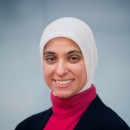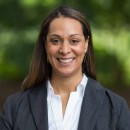Faculty News
Pages
 Ayesha Ghazi Edwin Receives 2024 James T. Neubacher Award
Ayesha Ghazi Edwin Receives 2024 James T. Neubacher AwardClinical Assistant Professor Ayesha Ghazi Edwin is the recipient of the 2024 James T. Neubacher Award. The annual U-M award is presented to a student, alumn, faculty or staff member who has exhibited leadership and service in support of the disability community.
“I am deeply honored to receive the James T. Neubacher Award. This recognition reflects the work of so many people committed to disability justice within our university and community. My journey as an advocate began with my own experiences as a student facing new health challenges, and it has grown through partnerships with incredible students, community members and colleagues at the School of Social Work. These experiences have also guided my work on the Ann Arbor City Council, where I strive to help create a more accessible and inclusive community. I am grateful to contribute to our shared work of building spaces where all of us can thrive.”
- November 8, 2024
- Learn more »

 Anao Zhang and Rachel Brandon Receive Children’s Cancer Research Fund Grant
Anao Zhang and Rachel Brandon Receive Children’s Cancer Research Fund GrantAssociate Professor Anao Zhang and PhD student Rachel Brandon are part of a team that recently received a grant from the Children's Cancer Research Fund. Their project evaluates the virtual delivery of a strength-based psychological treatment to young adults with cancer.
“We are excited to receive this grant and conduct a pilot clinical trial at Michigan Medicine's Adolescent and Young Adult Oncology Program,” said Zhang. “It is also very exciting to involve Rachel Brandon, a joint social work and psychological doctoral student, as a study co-investigator and project coordinator to further boost the implementation of the trial.”
- October 23, 2024
 Fatima Salman Appointed Vice President of the National Association of Social Workers
Fatima Salman Appointed Vice President of the National Association of Social WorkersENGAGE Program Manager Fatima Salman, MSW ’15, has been appointed Vice President of the National Association of Social Workers (NASW). Previously, Salman was president of the NASW Michigan Chapter and chair of the NASW Council of Chapter Presidents.
“I am excited to step into the role of vice president of this very critical organization that serves all social workers in the country,” said Salman. “I look forward to bringing my diverse background and strong skill sets to this organization and hope to be an asset as we champion social justice and empower social workers. I also am happy to be able to represent the University of Michigan School of Social Work —the top social work school in the country — in this national role.”
- October 23, 2024
- Learn more »


 ENGAGE 2024 Small Grant Recipients Announced
ENGAGE 2024 Small Grant Recipients AnnouncedIn 2018, ENGAGE launched the Small Grants Program to encourage faculty to build partnerships with Detroit community-based organizations and to support resident-led efforts to strengthen Detroit neighborhoods. These awards are supported by the Office of the Provost and are part of the School of Social Work’s strategic effort to connect Detroit engagement efforts and increase impact in the city. ENGAGE partners with the School of Public Health’s Detroit Urban Research Center in the administration of the small grants program. Here are this year’s grant recipients:
- “Empowering Detroit Together: Building Community Impact Partnerships”
Faculty Member: Clinical Associate Professor Abigail Eiler
Community Partner: Yusef Shakur, Co-Executive Director, Michigan Roundtable
- “Black Ecclesiastical Intervention to Help Equip Affected Lives Enduring Mental Disorders (BE HEALED)”
Faculty Members: Professor Rich Tolman and Associate Professor Addie Weaver
Community Partner: Pastor Charles Williams, Community Investigator
- October 14, 2024
- “Empowering Detroit Together: Building Community Impact Partnerships”
 Lorraine Guitérrez Receives Inaugural Maria B. Cerdas Trailblazer Award
Lorraine Guitérrez Receives Inaugural Maria B. Cerdas Trailblazer AwardProfessor Emerita Lorraine Guitérrez received the inaugural Maria B. Cerdas Trailblazer Award at the Latino Social Workers Organization’s National Latinx Social Work Conference in Chicago last week; she was also the keynote speaker. The award is named after Cerdas who became the first Latina member of the Chicago Board of Education in the 1960s.
- October 14, 2024
- Learn more »
 Ayesha Ghazi Edwin Discusses the “Right to Sit” with CBS Detroit
Ayesha Ghazi Edwin Discusses the “Right to Sit” with CBS DetroitClinical Assistant Professor Ayesha Ghazi Edwin spoke with CBS Detroit about a new “right to sit” ordinance she introduced in her role as Ann Arbor City Council Member. MSW student Jessica Riley’s participation in the public comments is included as part of the story. The ordinance was approved in October.
Additional media coverage:
- October 4, 2024
- Learn more »
 Shawna Lee’s Research Cited in Tech Explorist
Shawna Lee’s Research Cited in Tech ExploristProfessor Shawna Lee’s research on how fathers are connecting with their children — despite economic hardship and negative stereotypes — has been cited in an article on Tech Explorist. Lee and her co-authors call for these positive experiences to be reflected in the media and for health care providers to support father-inclusive practices.
- October 4, 2024
- Learn more »
 William Elliott III Discusses the Connection between CSAs and Hope with KQED
William Elliott III Discusses the Connection between CSAs and Hope with KQEDProfessor William Elliott III spoke with San Francisco’s KQED about how children’s savings accounts can provide hope and change perspectives. “You are giving families access to an institution that allows them to build wealth that’s coupled with a change in attitude and reflecting on what’s now achievable for them,” Elliott said.
- October 4, 2024
- Learn more »
 Xiaoling Xiang Awarded Grant from Administration for Community Living
Xiaoling Xiang Awarded Grant from Administration for Community LivingAssociate Professor Xiaoling Xiang is the principal investigator of a recently-funded federal grant from the Administration for Community Living’s National Institute on Disability, Independent Living, and Rehabilitation Research. The three-year study will focus on evaluating the real-world effects of the Empower@Home program on social participation among older adults with disabilities. Empower@Home is an online self-help program for depression based on the principles of cognitive behavioral therapy.
“I am thrilled to build on the momentum of our recent NIH R01 award to further expand Empower@Home’s community impact,” said Xiang. “Our goal is to extend its reach to older adults with disabilities and broaden its focus beyond a single condition to encompass outcomes like social participation and connections. This brings us closer to achieving our mission of promoting the multi-dimensional aspects of healthy aging.”
- October 4, 2024
 Fernanda Cross Speaks with WXYZ Detroit About Supporting Immigrant Students
Fernanda Cross Speaks with WXYZ Detroit About Supporting Immigrant StudentsAssistant Professor Fernanda Cross spoke with WXYZ Detroit about how her own experience as an immigrant inspired the creation of the Latinx Youth Empowerment Series, also known as YES, which connects immigrant students at Ypsilanti Community High School with mental health services.
“Immigrating is difficult. The children are having to do a lot of the navigating the new culture. They’re navigating the new language for the parents as they are learning the language themselves,” Cross said. “For the adolescents that come from undocumented parents, there’s always this constant fear of getting separated from the family, having one of the caregivers deported or being deported themselves in case the adolescents,” she said. “These students were very likely never going to see a provider if it had not been for these groups.”
YES has been so successful that the Michigan Health Endowment Foundation is funding six additional groups over the next two years.
- October 3, 2024
- Learn more »